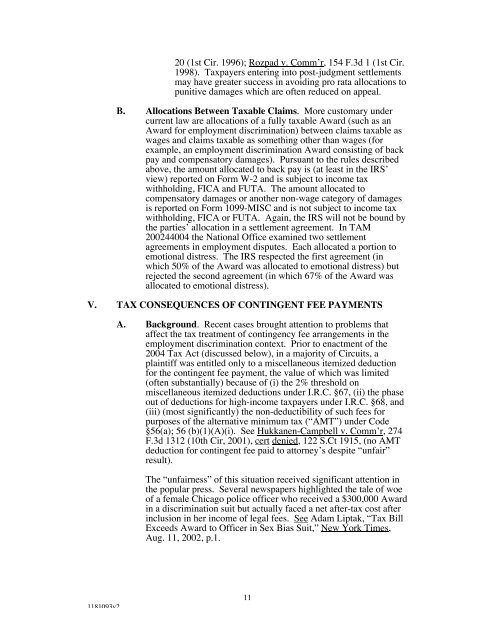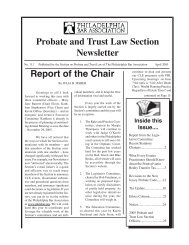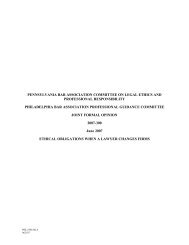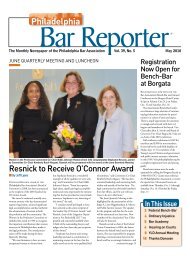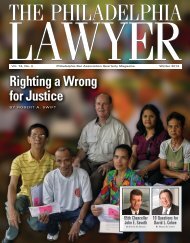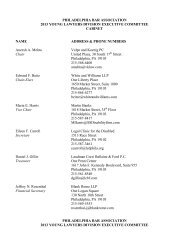Tax Aspects of Litigation Awards and Settlements - Philadelphia Bar ...
Tax Aspects of Litigation Awards and Settlements - Philadelphia Bar ...
Tax Aspects of Litigation Awards and Settlements - Philadelphia Bar ...
You also want an ePaper? Increase the reach of your titles
YUMPU automatically turns print PDFs into web optimized ePapers that Google loves.
20 (1st Cir. 1996); Rozpad v. Comm’r, 154 F.3d 1 (1st Cir.<br />
1998). <strong>Tax</strong>payers entering into post-judgment settlements<br />
may have greater success in avoiding pro rata allocations to<br />
punitive damages which are <strong>of</strong>ten reduced on appeal.<br />
B. Allocations Between <strong>Tax</strong>able Claims. More customary under<br />
current law are allocations <strong>of</strong> a fully taxable Award (such as an<br />
Award for employment discrimination) between claims taxable as<br />
wages <strong>and</strong> claims taxable as something other than wages (for<br />
example, an employment discrimination Award consisting <strong>of</strong> back<br />
pay <strong>and</strong> compensatory damages). Pursuant to the rules described<br />
above, the amount allocated to back pay is (at least in the IRS’<br />
view) reported on Form W-2 <strong>and</strong> is subject to income tax<br />
withholding, FICA <strong>and</strong> FUTA. The amount allocated to<br />
compensatory damages or another non-wage category <strong>of</strong> damages<br />
is reported on Form 1099-MISC <strong>and</strong> is not subject to income tax<br />
withholding, FICA or FUTA. Again, the IRS will not be bound by<br />
the parties’ allocation in a settlement agreement. In TAM<br />
200244004 the National Office examined two settlement<br />
agreements in employment disputes. Each allocated a portion to<br />
emotional distress. The IRS respected the first agreement (in<br />
which 50% <strong>of</strong> the Award was allocated to emotional distress) but<br />
rejected the second agreement (in which 67% <strong>of</strong> the Award was<br />
allocated to emotional distress).<br />
V. TAX CONSEQUENCES OF CONTINGENT FEE PAYMENTS<br />
A. Background. Recent cases brought attention to problems that<br />
affect the tax treatment <strong>of</strong> contingency fee arrangements in the<br />
employment discrimination context. Prior to enactment <strong>of</strong> the<br />
2004 <strong>Tax</strong> Act (discussed below), in a majority <strong>of</strong> Circuits, a<br />
plaintiff was entitled only to a miscellaneous itemized deduction<br />
for the contingent fee payment, the value <strong>of</strong> which was limited<br />
(<strong>of</strong>ten substantially) because <strong>of</strong> (i) the 2% threshold on<br />
miscellaneous itemized deductions under I.R.C. §67, (ii) the phase<br />
out <strong>of</strong> deductions for high-income taxpayers under I.R.C. §68, <strong>and</strong><br />
(iii) (most significantly) the non-deductibility <strong>of</strong> such fees for<br />
purposes <strong>of</strong> the alternative minimum tax (“AMT”) under Code<br />
§56(a); 56 (b)(1)(A)(i). See Hukkanen-Campbell v. Comm’r, 274<br />
F.3d 1312 (10th Cir, 2001), cert denied, 122 S.Ct 1915, (no AMT<br />
deduction for contingent fee paid to attorney’s despite “unfair”<br />
result).<br />
The “unfairness” <strong>of</strong> this situation received significant attention in<br />
the popular press. Several newspapers highlighted the tale <strong>of</strong> woe<br />
<strong>of</strong> a female Chicago police <strong>of</strong>ficer who received a $300,000 Award<br />
in a discrimination suit but actually faced a net after-tax cost after<br />
inclusion in her income <strong>of</strong> legal fees. See Adam Liptak, “<strong>Tax</strong> Bill<br />
Exceeds Award to Officer in Sex Bias Suit,” New York Times,<br />
Aug. 11, 2002, p.1.<br />
1181093v2<br />
11


